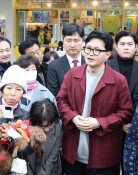[Opinion] Happiness and Age
The book industry targets people in their 40s as a niche market. Han Soon, the president of the publisher Namusaenggak which will publish a book on aging, said, People in their 40s face job insecurity and uncertainty after retirement, and look for solutions in books.
Lee Gyeong-soo, the author of Psychology at Age 40, confesses that at 40, he feels tempted to leave his routine life to go somewhere and longs for love. Out of the blue, he says he wants long hair and to cry watching TV dramas.
Finding those in their 40s who feel depressed is not difficult, since hard work in their earlier years has not seemed to bring them enough financial comfort. While their physical strength declines with age, they still have a long way to go.
Andrew Oswald, a professor at the University of Warwick in England, analyzed the results of a psychological survey of about two million people in 80 countries. He said the average age when people are likely to feel depressed is 44.
Interestingly, variables such as marital status, income disparity, jobs, income level and whether one was from a developing or developed country did not affect the final outcome, as did whether one had children. Yet the analysis shows that women can experience age-related depression a few years earlier than men.
People get depressed in their 40s because they learn that there is a limit to their life that they cannot exceed, no matter what the desire. There comes an inner conflict between the need to accept reality and anxiety for a reversal as time runs out.
Faced with job insecurity and aging, Koreans in their 40s are under double stress in having to think about a new job in the event of early retirement or layoff. The online education company Eduspa in a survey found that people think their second act in life begins at 41.
As the average life expectancy increases, greater financial preparation for later years is putting a heavier burden on the middle-aged. The anxiety is that without financial capability, longevity turns into disaster, not a dream.
Gerontologist Goh Gwang-ae advises that though money is important, what matters more are friends to talk to. Without good friends, money is of little use.
While tips on aging properly are abundant, Oswalds advice is simply that time cures all. Statistics show that human happiness peaks in the teens followed by a downward spiral, bottoming out in the 40s. Happiness returns to an upward trajectory in the 50s, making a U-shaped graph.
This is because when people get older, they can give up more things and accept reality. If this is what the maxim people become happier with age really means, I would like that.
Editorial writer Huh Mun-myeong, angelhuh@donga.com







